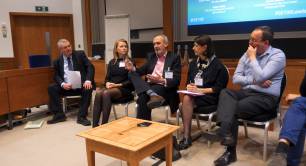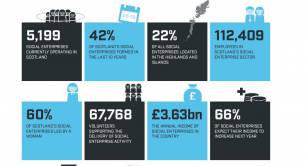Resilient Scotland: making social investment affordable
In a series profiling social investment finance intermediaries, we take a look at Resilient Scotland.
It’s an oft-heard lament in social enterprise that the the right kind of social investment is not readily available at the smaller end of the market.
As with so many other social enterprise-related matters, Scotland has taken a lead. In the first in a series of articles looking at the social investment finance intermediaries (SIFIs), we thought we’d get to know Resilient Scotland better.
The organisation was founded as the corporate trustee of JESSICA (Scotland) Trust. The JESSICA (Scotland) Trust was given an endowment of £15m by Big Lottery Fund Scotland – Resilient Scotland is the business that manages that money.
That money is to be dispersed over ten years, with interest payments paying for the overheads at Resilient – essentially, staff (of which there are only four), office space and legal representation.
Resilient invests in projects that contribute to the sustainable regeneration of areas and communities affected by long-term economic decline.
Following criticism of social investment by Fraser Kelly, CEO of Social Enterprise Scotland at the NatWest SE100 Leadership Event last week, Resilient also interested us because it's one of very few organisations to lend below £60,000.
Resilient has two very simple offerings: Start & Grow, which offers between £10,000 and £60,000 to early-stage social ventures and Making Enterprise Happen, which starts from £61,000 and goes up to £500,000 for those organisations scaling up.
Start and Grow investment is blended finance, always a mix of one-third grant and two-thirds loan. As an example, £60,000 would mean £20,000 grant and £40,000 loan. At the time of writing, this would mean 60 monthly payments of £777.97.
The larger Making Enterprise Happen investment is half grant and half loan, with the term of the loan being flexible up to ten years.
We are able to operate at the lower reaches of the market to those that we see as needing it most
Looking at the list of investments that Resilient has made, some are as low as £19,000. In the discussion at the SE100 event, Kelly suggested banks couldn’t lend such low amounts affordably, with management fees likely to bring the interest rate to 9%. So given Resilient’s rates of 6.25%, how does it make it work?
“It’s a unique model,” explains Resilient head Chris Holloway. “If we were doing some wholesale lending from Big Society Capital, then you’ve got to pay their coupon and then there is an operating cost on top of that and that makes it difficult to offer low-level loans. That’s why some of the SIFIs only offer loans over £250,000.”
“Because of our operating model and the benefits of our endowment we are able to operate at the lower reaches of the market to those that we see as needing it most.”
From pants to empowerment
So who are their investees? Asked to give an example, Holloway points towards MsMissMrs. The organisation is certainly memorable; it sells ‘empowerment pants’ – underwear with superhero crests (pictured above) – with the profits funding empowerment courses.
The courses boost self-esteem for women from difficult backgrounds, promote healthy lifestyles and offer business training for entrepreneurs. Resilient has loaned more than £7m to 60 other organisations too, most of which can be found on its website.
The subject of grants is often delicate with social businesses, with pride in trading for profit which goes to good causes often being the line in the sand that distinguishes them from charities. So what was the thinking behind the blended finance mix of grant and loan?
Holloway says Resilient learnt from Key Fund in Sheffield: “If it was a private start-up market they always rely on equity so we realised we could play that role.” In other words, as the money must be dispersed within ten years, it is there to be used.
Holloway says Resilient’s duty is to maximise the value of the endowment. When pressed on this, he explains: “We could do that with ten £500k investments each year or we could try and help as many people at the lower end of the market as we can.”
“The SEUK State of the Sector report for the last couple of years says that the lending needs of your average social enterprise is between £58k and £60k and that is where we see our sweet spot as being.”
Social Enterprise Scotland's Social Enterprise Exchange Marketplace event takes place in Edinburgh on Tuesday 21 March, bringing together hundreds of people to explore new opportunities for trading, learning and making connections. First minister Nicola Sturgeon is speaking and Pioneers Post is delighted to be a media partner for this key event. For more information, click here. #SocEntEx17.



